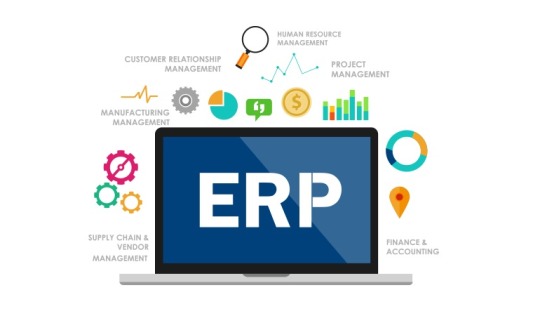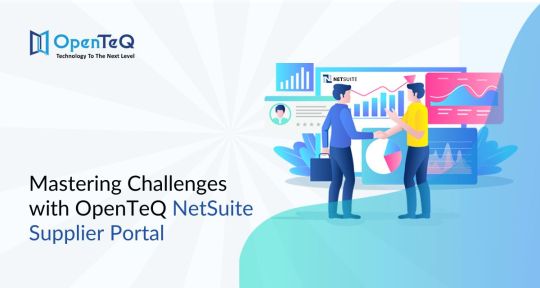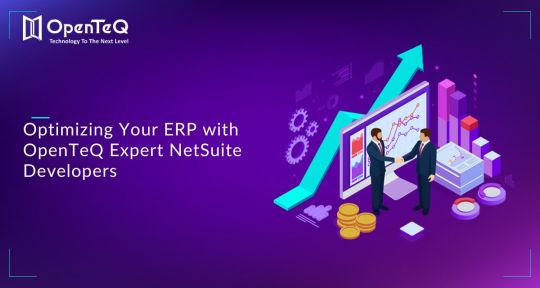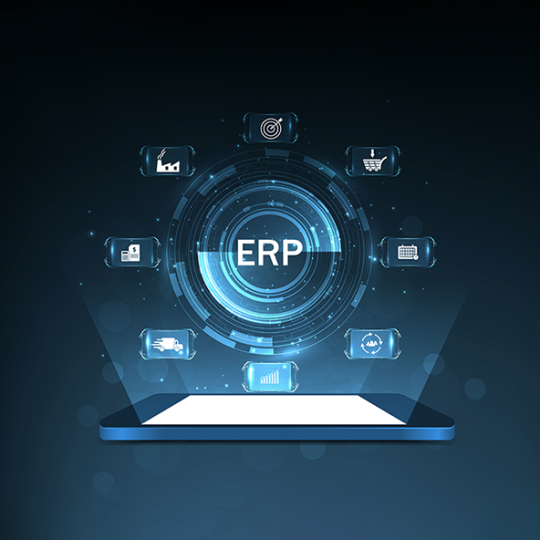#ERP-CRM integration
Explore tagged Tumblr posts
Text
In today's highly competitive market, retaining existing customers is just as important as acquiring new ones. For businesses, the key lies in understanding customer needs, predicting behaviors, and delivering personalized experiences. Achieving this requires seamless collaboration between two essential systems: Enterprise Resource Planning (ERP) and Customer Relationship Management (CRM).
0 notes
Text
How can ERP and CRM Integration Help your Business?
Is your sales team equipped to provide instant solutions to customers’ queries? If not, then your operations need a fast-paced and adaptive approach, just as the market demands. And the road to that journey begins with streamlining your sales and marketing processes.
Now that we are talking about optimizing business operations, ERP and CRM integration is your best bet. This integration solution needs no introduction, does it? Definitely not! Integrating ERP with CRM allows you to expand your operational capabilities and ensure your businesses drive higher efficiency and productivity.
So, if you’re unaware of how ERP CRM integration can help your business, let’s fill you in with all the insights.
When ERP and CRM come together, they create the ultimate solution for your business.
Cloud-based ERP system delivers a comprehensive suite of tools to help businesses manage their financials, CRM, trading, and project management. It comes with a user-friendly interface that is highly customizable to meet the unique requirements of your business.
On the other hand, Cloud-based CRM software that helps businesses manage their sales and marketing operations. It comes with a range of tools to further help businesses to drive customer experience, business leads, sales, and more.
ERP and CRM integration has been the emerging trends in the market for businesses to attain higher productivity, enhanced operations, and better collaborations. And without a doubt, ERP –CRM integration is the most preferred integration solution by businesses.
The integration focuses on helping businesses retain customers and improve customer engagement. It effortlessly synchronizes order history, customer data, and payment details to ensure enterprises get a comprehensive customer view.
However, these are a few of the many advantages you can experience if you choose ERP — CRM Integration Let’s have a detailed look at it!
The Inevitable Need of ERP and CRM Integration
Before you even begin thinking of ERP CRM Integration, it is crucial to understand why a business should integrate ERP and CRM systems. And the answer is ‘Happy Customers’. Customer satisfaction is one crucial factor that defines a company’s success. Therefore, organizations always look for new ways to enhance customer relationships. And it’s the CRM and ERP integration that helps you do that effortlessly.
The ERP — CRM Integration gives an huge potential to operate seamlessly. It allows access to customer data from CRM and financial data from ERP in a single environment, enabling automation and enhanced workflows.
ERP and CRM Integration becomes crucial if you want to increase your sales revenue faster and more seamless operations. Besides, you also get real-time data analytics, which helps you make better decisions
Benefits of ERP with CRM Integration
Now that we’ve filled you in with the information on the need of ERP and CRM Integration, let’s specifically talk about the benefits of ERP with CRM Integration
1.Streamlined Workflows
The integration facilitates automation, which helps your business expand its ability to perform complex tasks easily. With the integration, you can create custom workflows that automate repetitive tasks, reducing dependency on manual data entry. The less manual intervention streamlines your workflows and operations.
2. Seamless Data Flow
When you are not using the integration or when your systems aren’t connected, you need to ensure manual data import and export between ERP and CRM. It not only makes the process lengthy but also increases the chances of human errors in the data.
And in ERP with CRM Integration, both systems speak the same language. It means the data flows seamlessly from CRM to ERP and vice versa. When the customer and transactional data are synched, users can access real-time accurate information and can make quick decisions.
3. Better Collaboration
Is your sales and marketing team able to work in sync? We assume you don’t have a convincing answer. But with ERP and CRM integration, it isn’t the case. The real-time data makes it a lot easier for both sales and marketing teams to work in collaboration.
The ERP — CRM integration allows finance teams to see open sales orders and payment status in real-time. This means they don’t have to send unnecessary emails and arrange meetings with the sales team for invoice queries.
The Best Way to Integrate ERP and CRM
After understanding the need of ERP and CRM , we’re sure you must be now looking for ways to integrate the systems. Well, let’s give you a quick brief on that as well!
1. Manual Integration
Manual integration basically means setting up your own in-house team for ERP and CRM . This type of integration follows a manual approach through manual entries and spreadsheet imports and exports. However, this is a time-consuming approach.
2. Custom Integration
As the name itself suggests, custom integration gives you the liberty to manage and modify the integration as per your business needs. The custom integration can be designed to make changes in established data fields, streamline complex processes, and meet specific business requirements. However, this type of integration needs technical expertise and is also time-consuming.
3. Third-Party Integration
Third-party integration refers to choosing a third-party integration provider for ERP and CRM integrations There are many third-party integration platforms that provide pre-built connectors to ensure seamless data transfer between ERP and CRM
Read more on: https://www.greytrix.com/blogs/salesforce/2024/03/21/how-can-the-acumatica-erp-salesforce-integration-help-your-business/
0 notes
Text
Looking to optimize your manufacturing operations? Learn how integrating Salesforce with your ERP system can boost efficiency and business insights. Don't miss our latest blog post!
#salesforce#erp for manufacturing#manufacturing#integration#crm solution#crm integration#automation#salesforce partner#technolgy#business#getoncrm
4 notes
·
View notes
Text
#erp software#cloud erp#erp application#erp consulting services#erp development company#erp development services#erp for small business#erp system#erp integration#crm software#erp for manufacturing
1 note
·
View note
Text
Choosing the Best ERP Software in Bangladesh: A Complete Guide
Selecting the best ERP software in Bangladesh is essential for businesses aiming to enhance productivity and streamline operations. Whether you require a custom ERP software tailored to your unique needs or a pre-built ERP solution, making the right choice can drive efficiency and growth.

Why Your Business Needs an ERP Solution
An ERP system integrates core business functions such as finance, inventory, HR, and sales into a single, efficient platform. The right ERP solution helps businesses: ✅ Automate repetitive tasks and improve workflow efficiency. ✅ Gain real-time insights for smarter decision-making. ✅ Reduce operational costs and increase profitability.
Best ERP Software for Small Businesses
For small and medium-sized businesses, selecting the best ERP software for small business is crucial. The ideal ERP should be: 🔹 Budget-friendly and easy to implement. 🔹 Customizable to match specific business requirements. 🔹 Cloud-based for enhanced accessibility and remote management.
Finding the Right ERP Provider in Bangladesh
Choosing a trusted software company in Bangladesh ensures you get a robust ERP system that meets your business goals. Look for a software development company in Bangladesh that offers: ✔ Industry-specific ERP customization. ✔ Reliable technical support and regular system updates. ✔ Scalable solutions that grow with your business.
Final Thoughts
Collaborating with the best software company in Bangladesh guarantees an ERP system that optimizes operations and drives success. What features do you look for in an ERP solution? Share your thoughts! 🚀
#web app development#website design development#website development#offshore company setup#offshore software development#software development#erp software#erp system#erp solution bd#erp implementation#erp integration#crm software#businesssolutions#analytics
0 notes
Text
1 note
·
View note
Text
Leading Roulette Game Development Company in Noida – Thixpro Technologies
The world of online gaming has grown exponentially over the past few years, and the gambling industry, especially online roulette, has witnessed a surge in demand. As one of the most iconic casino games, roulette offers excitement, anticipation, and the chance to win big. At Thixpro Technologies, we are proud to be a leading roulette game development company in Noida, specializing in crafting…

View On WordPress
#API Integration development Company In Noida#Best Digital Marketing Company In Noida at affordable price#Chess Game Development Company in Noida#CRM Software Development Company in Noida#ERP Software Development Company in noida#Game Development Company in Noida#Leading Roulette Game Development Company in Noida#Mobile Game App Development Company in Noida#Payment Gateway Integration company In Noida#Top E-commerce Website Development Company in Noida#Top Website Development Company in Noida
0 notes
Text
What Makes a Salesforce Platinum Consulting Partner the Right Choice for Your Organization?
Salesforce is a powerful platform that can transform the way businesses manage customer relationships, automate processes, and improve efficiency. However, to unlock the full potential of Salesforce, it is essential to work with an experienced consultant who understands your unique business needs. A Salesforce Platinum Consulting Partner offers a wealth of expertise and proven capabilities to help you maximize the benefits of Salesforce, ensuring that your organization achieves its CRM goals. In this article, we explore the advantages of working with a Salesforce Platinum Consulting Partner and how they can help your business succeed.
What is a Salesforce Platinum Consulting Partner?
A Salesforce Platinum Consulting Partner is a consulting firm recognized by Salesforce for its deep expertise, successful project delivery, and commitment to customer success. Achieving Platinum status is no small feat, as it requires meeting stringent criteria, such as a proven track record of high-quality Salesforce implementations and expert-level certifications. Salesforce Platinum Partners typically have experience across various industries and provide services that range from system implementation to custom application development, cloud solutions, and ongoing support.
The primary difference between a Platinum Partner and other Salesforce consultants lies in their level of experience and ability to handle complex, large-scale Salesforce implementations. Platinum Partners have access to advanced Salesforce resources, including tools, training, and specialized expertise that can accelerate your Salesforce journey.

Benefits of Working with a Salesforce Platinum Consulting Partner
1. Expertise in Salesforce Solutions
A Salesforce Platinum Consulting Partner brings deep knowledge and experience to the table. They are certified experts in Salesforce products, which allows them to provide highly effective, customized solutions to fit your organization’s needs. Whether you are using Salesforce Sales Cloud, Marketing Cloud, Service Cloud, or another Salesforce product, a Platinum Partner ensures that you are leveraging the platform to its full potential.
These consultants can help optimize your CRM processes, streamline sales and marketing activities, and create tailored dashboards and reports that provide valuable insights into your business performance. Their expertise in Salesforce solutions ensures that your implementation is both efficient and impactful.
2. Customized Salesforce Implementation
Every business is unique, and your Salesforce solution should reflect that. A Salesforce Platinum Consulting Partner works closely with your team to understand your business objectives, challenges, and workflows. They then design a customized Salesforce solution that aligns with your needs, ensuring that the implementation supports your organization’s specific goals.
By tailoring Salesforce to your processes, a Platinum Partner can help improve productivity, enhance collaboration, and create a seamless experience for your team. Customized solutions also provide greater flexibility and scalability, allowing your CRM system to evolve as your business grows.
3. Faster Implementation and Time-to-Value
Time is of the essence when implementing Salesforce, and Platinum Partners have the experience and resources to deliver faster results. With their structured approach, proven methodology, and access to Salesforce’s exclusive tools, Platinum Partners can help you implement Salesforce in a shorter timeframe. This faster implementation allows your organization to start realizing the benefits of the CRM system much sooner.
Moreover, Platinum Partners have a clear understanding of the common pitfalls in Salesforce implementations and can proactively address any issues that may arise. Their deep experience helps reduce the risks associated with deployment, ensuring a smoother transition to your new CRM system.
4. Ongoing Support and Optimization
The work doesn’t stop once Salesforce is implemented. Ongoing support and optimization are critical to ensuring your Salesforce system continues to meet your evolving business needs. A Salesforce Platinum Consulting Partner offers continuous support, including system updates, troubleshooting, and optimization services, to ensure your CRM solution remains effective over time.
Platinum Partners also provide training and guidance to help your team get the most out of Salesforce, empowering users to fully utilize the platform’s features. Whether you need assistance with system updates, new feature integrations, or additional customization, Platinum Partners are there to help.
5. Advanced Tools and Resources
Salesforce Platinum Partners have access to advanced tools and resources that can enhance the implementation process. These resources include early access to new features, training programs, and support from Salesforce’s internal teams. By leveraging these tools, Platinum Partners can implement the latest Salesforce innovations more quickly, helping you stay ahead of the competition.
Additionally, Platinum Partners often participate in beta programs, allowing them to test new Salesforce products and features before they are officially released. This gives them a competitive edge when it comes to providing cutting-edge solutions to their clients.
6. Seamless Integration with Other Systems
In today’s business environment, your CRM system doesn’t exist in a vacuum. Salesforce is often integrated with other enterprise systems, such as ERP, HR, and accounting software, to create a unified platform that supports all aspects of your business. A Salesforce Platinum Consulting Partner has the expertise to ensure that your Salesforce system integrates seamlessly with these other tools, eliminating data silos and ensuring smooth information flow across your organization.
This integration enhances data accuracy, reduces manual processes, and improves decision-making. Platinum Partners can also help you optimize workflows and automate processes, further increasing operational efficiency.
7. Scalability for Growth
As your business grows, your CRM system needs to scale with you. A Salesforce Platinum Consulting Partner designs solutions that are flexible and scalable, ensuring your Salesforce system can accommodate new users, additional data, and new features as your business expands. They plan for future growth by implementing best practices and architecture that allows your Salesforce system to evolve alongside your business.
Whether you’re adding new departments, expanding to new markets, or introducing new products or services, a Platinum Partner ensures that your Salesforce solution can handle the increased demands.
TechMatrix Consulting: A Salesforce Platinum Consulting Partner
TechMatrix Consulting is a Salesforce Platinum Consulting Partner that specializes in providing customized Salesforce solutions to organizations across various industries. With expertise in Salesforce implementation, cloud strategies, app development, and marketing automation, TechMatrix helps businesses maximize the potential of their Salesforce CRM.
TechMatrix offers tailored solutions for industries such as healthcare, retail, finance, and manufacturing. Their team of certified Salesforce professionals works closely with clients to understand their unique needs and deliver solutions that optimize business processes, improve customer engagement, and drive growth.
Frequently Asked Questions (FAQs)
What is the difference between a Salesforce Platinum Consulting Partner and other Salesforce consultants? A Salesforce Platinum Consulting Partner is a firm recognized by Salesforce for its advanced expertise, proven success, and ability to handle complex, large-scale implementations. Platinum Partners have access to exclusive resources, tools, and training to ensure a high-quality Salesforce deployment.
How do I know if I need a Salesforce Platinum Consulting Partner? If your business is implementing Salesforce on a large scale or requires highly customized solutions, a Salesforce Platinum Consulting Partner is the best choice. They provide the expertise and support necessary for a smooth, efficient implementation that aligns with your business goals.
What industries do Salesforce Platinum Partners serve? Salesforce Platinum Consulting Partners serve a wide range of industries, including healthcare, finance, retail, manufacturing, and more. They offer tailored solutions that address the unique needs of each sector.
What ongoing support do I receive after implementing Salesforce? A Salesforce Platinum Consulting Partner provides ongoing support, including regular system updates, troubleshooting, optimization, and training. They help ensure that your Salesforce solution evolves with your business needs.
Can a Salesforce Platinum Partner integrate Salesforce with other business systems? Yes, Salesforce Platinum Partners specialize in integrating Salesforce with other enterprise systems such as ERP, HR, and accounting software. This ensures that your business operations work seamlessly together and enhances data accuracy.
Conclusion
Working with a Salesforce Platinum Consulting Partner provides your organization with the expertise, resources, and support necessary to fully leverage Salesforce’s capabilities. From customized implementations to ongoing optimization and support, a Platinum Partner ensures that your CRM system drives business success. Whether you are just getting started with Salesforce or looking to optimize your existing implementation, a Platinum partner like TechMatrix Consulting can help you achieve your goals.
#Salesforce Platinum Consulting Partner#Salesforce CRM solutions#Salesforce implementation#Custom Salesforce solutions#Salesforce expertise#Cloud consulting#Marketing automation#Salesforce integration#Business process optimization#Salesforce scalability#Salesforce consulting services#CRM system support#TechMatrix Consulting#Salesforce integration with ERP#Salesforce support and maintenance#Tailored Salesforce solution
0 notes
Text
#technews#Enterprise Resource Planning (ERP)#ERP Solutions#Business Management Software#Integrated Business Applications#Supply Chain Management#Customer Relationship Management (CRM)#Financial Management Systems#Human Resources Management#Inventory Management Software#Manufacturing Resource Planning#Cloud ERP Solutions#On-Premise ERP Systems#ERP Implementation Services#ERP Consulting#ERP Software for Small Business#ERP Software for Manufacturing#ERP System Integration#ERP Software Development#ERP Customization Services#ERP Training and Support
0 notes
Text
0 notes
Text
AI, machine learning, and cloud technology are revolutionizing Odoo. Discover how these advancements are shaping the future of ERP systems and boosting business efficiency.
#future of odoo#ai#machine learning#cloud integration#odoo crm#odoo development company#odoo#odoo erp#business#odoo services#startup
1 note
·
View note
Text
Mastering Challenges with OpenTeQ NetSuite Supplier Portal

Businesses encounter several obstacles in the fast-paced business world of today as they work to increase customer satisfaction, streamline operations, and promote sustainable growth. Many companies use NetSuite, a powerful cloud-based ERP platform that provides all-inclusive solutions for supply chain management and customer relationship management (CRM), to get over these challenges. Businesses may fully utilize NetSuite's capabilities to overcome obstacles and open up new growth prospects with the help of Certified NetSuite Consultants and the appropriate implementation plan.
The Role of Certified NetSuite Consultant
Navigating the complexities of NetSuite can be daunting without the right expertise. This is where Certified NetSuite Consultants come in. These professionals possess in-depth knowledge of the platform’s features and capabilities, ensuring businesses can implement and customize NetSuite to meet their specific needs. Whether it’s configuring workflows, setting up dashboards, or integrating third-party systems, certified consultants provide the expertise needed to ensure a smooth and efficient implementation process.
At OpenTeQ, we offer access to a team of experienced Certified NetSuite Consultants who work closely with businesses to identify pain points and tailor NetSuite solutions to overcome them. By having the right consultants on board, companies can accelerate their NetSuite deployment and begin seeing results quickly.
Streamlining Supply Chain Management with the NetSuite Supplier Portal
Effective supply chain management is critical for business success. Managing supplier relationships, tracking inventory, and ensuring timely deliveries can be challenging, especially as businesses scale. The NetSuite Supplier Portal simplifies this process by offering a centralized platform where suppliers can interact with your business in real time. Through the portal, suppliers can track purchase orders, submit invoices, and view order statuses, making it easier for businesses to manage their supply chain and improve operational efficiency.
OpenTeQ’s NetSuite specialists can customize the NetSuite Supplier Portal to fit your business's unique requirements. With our customization services, businesses can streamline communication with suppliers, reduce errors, and improve visibility into the supply chain, driving greater efficiency and cost savings.
Expanding Business Opportunities with NetSuite B2B Portals
For businesses engaged in business-to-business (B2B) transactions, seamless communication and collaboration with partners are essential. NetSuite B2B Portals offer a secure and user-friendly platform that enables businesses to interact with their B2B clients effortlessly. These portals provide features like order management, real-time updates, and self-service capabilities, allowing partners to access the information they need without having to go through customer service representatives.
By leveraging NetSuite B2B Portals, businesses can provide a better experience for their partners, streamline order processing, and improve overall efficiency. OpenTeQ helps companies customize their B2B portals, ensuring that they align with specific workflows and business processes, ultimately enhancing client relationships and driving revenue growth.
Enhancing Customer Relationships with NetSuite CRM
Customer relationship management (CRM) is a crucial component of any business growth strategy. NetSuite’s integrated CRM solution provides businesses with a 360-degree view of their customers, enabling them to manage interactions, track sales leads, and improve customer retention. From sales and marketing to customer service, NetSuite CRM allows businesses to stay on top of their customer data, ensuring that they can deliver personalized experiences and build stronger relationships.
By working with OpenTeQ, businesses can optimize their NetSuite CRM to fit their specific needs. Our team of experts ensures that your CRM system is configured to capture the right data and streamline customer interactions, allowing your business to enhance customer satisfaction and foster long-term loyalty.
Overcoming Challenges and Driving Growth
Despite the advantages that NetSuite provides, businesses may still face challenges in adopting the platform effectively. Common obstacles include resistance to change, integration issues with legacy systems, and the need for customization to fit specific business processes. This is where having expert support from Certified NetSuite Consultants makes all the difference.
At OpenTeQ, we understand the challenges businesses face when implementing a new ERP system, and we work closely with clients to address these issues head-on. Our team helps businesses navigate the complexities of NetSuite, from customizing the NetSuite Supplier Portal to enhancing customer interactions through NetSuite CRM and NetSuite B2B Portals. Through tailored solutions and expert guidance, we help businesses overcome these challenges, optimize their NetSuite environment, and drive sustainable growth.
Conclusion
NetSuite is a powerful tool for businesses looking to streamline operations, manage supplier relationships, and enhance customer engagement. Whether through the NetSuite Supplier Portal, NetSuite B2B Portals, or the NetSuite CRM businesses have access to comprehensive solutions that can help them overcome operational challenges and unlock new growth opportunities.
By partnering with OpenTeQ, businesses can leverage the expertise of Certified NetSuite Consultants to ensure a successful implementation and optimization of the platform. Our customized solutions enable businesses to enhance efficiency, improve customer relationships, and drive long-term growth. Whether you’re looking to streamline supply chain management, improve B2B transactions, or optimize your CRM, OpenTeQ is here to help you succeed with NetSuite.
#Certified NetSuite Consultants#NetSuite Supplier Portal#NetSuite B2B Portals#NetSuite CRM#NetSuite Solution Provider Partner#netsuite consultation#netsuite implementation company#netsuite implementation partner#netsuite support services#netsuite services#netsuite implementation consultant#netsuite erp implementation#netsuite erp consulting#netsuite integration platform#netsuite project implementation
0 notes
Text
Vatsin Technology Solutions Pvt. Ltd.
Microsoft Solution Partner - Helps in grow your Business
0 notes
Text
Optimizing Your ERP with OpenTeQ Expert NetSuite Developers

A NetSuite expert developer is simply in a position of being indispensable to enhance the functionality of the system as well as make it more user-friendly. Because businesses expand and grow, they need customized solutions that meet their specific functional needs in operations. Therefore, a NetSuite Developer brings his proficiency to customize the platform, develop custom scripts, workflows, and integrations to streamline business processes. Creating advanced financial reports, automating tasks, or integrating third-party applications - a NetSuite Developer ensures that maximum efficiency can be gained from the system.
NetSuite Support Services: Optimized Performance
It helps to take care of your NetSuite system's health. While you have the services post-implementation, they ensure that issues are resolved in time, and configurations are updated. It is also meant for monitoring performance. Thus, technical challenges are mitigated in quick time, and businesses can run with as few interruptions as possible.
NetSuite Support Services monitors and guides from troubleshooting to system upgrades. This proactive approach will avoid costly downtime, protect data integrity, and ensure your business is always equipped with the best version of the software. They ensure smooth sailing whether you have a bug to fix, an enhancement in the system, or need users trained.
Top NetSuite Services Provider: Leading for Business Solution End
The selection of the leading NetSuite Services Provider ensures that high-quality expertise, from implementation to ongoing support, reaches your business. A top-tier provider offers you the whole suite of NetSuite services, from consultancy, development, and implementation to customization and support, ensuring that all aspects of your NetSuite environment are professionally managed.
These providers will have an in-depth understanding of various industries and provide specific, tailor-made NetSuite solutions that uniquely add value to the businesses. Meanwhile, their comprehensive service offering not only streamlines the operations but makes growth and innovation possible by ensuring that NetSuite is aligned with business strategic goals. In this way, investing in best-in-class expertise coupled with ongoing support by one of the top NetSuite services providers maximizes value in investment.
NetSuite for Manufacturers: Industry solutions that cater to the manufacturing industry
NetSuite for Manufacturers is a suite of solutions designed to meet the unique needs of the manufacturing industry, such as simplifying the production process, streamlining inventory management, and supply chain operations. NetSuite ERP gives manufacturers real-time visibility in terms of how things get manufactured from procurement to distribution, thus making data-driven decisions that improve efficiency and save costs.
NetSuite allows manufacturers to handle complex production schedules, demand forecasting, and orders spread across different locations. Its robust inventory ensures businesses carry just the right amount of stock to avoid selling out and being short of stock. Finally, advanced analytics provides enough tracking and maximization of productivity in KPIs. In discrete and process manufacturing, NetSuite makes it possible to remain competitive even in fast-changing environments.
Conclusion
OpenTeQ Technologies is a trusted business partner serving any NetSuite-related needs. All services cover every aspect of the NetSuite platform, with an expert NetSuite developer onboard for customized development according to specific business needs to enhance functionality and performance. NetSuite Consultation services are also offered by OpenTeQ which helps provide strategic insight and guidance so that the business can get the most out of ERP investments.
Moreover, the company offers complete NetSuite Support Services, which would ensure that business is performed smoothly without interruption. OpenTeQ is one of the Top NetSuite Service Providers and offers unmatched expertise in every kind of industry- NetSuite for Manufacturers, with its solutions to help manufacturers best optimize production and manage the supply chain. Through the full range of services offered by OpenTeQ, companies will achieve operational excellence and sustainable growth.
#NetSuite Services#NetSuite Solutions Provider#NetSuite Implementation partner#NetSuite ERP Consulting#NetSuite ERP Implementation#NetSuite Consultation#NetSuite Support Services#NetSuite Integration Platform#NetSuite Implementation Consultant#NetSuite Technical Consultant#NetSuite Development#NetSuite Integration#NetSuite Developer#NetSuite Implementation Company#NetSuite Development Company#NetSuite ERP Support#NetSuite Project Implementation#NetSuite ERP Solution Provider#NetSuite Accounting Services#NetSuite Financial Software#NetSuite SP Partner#NetSuite Solution Provider Partner#NetSuite BPO Partner#NetSuite Customization#NetSuite Data Migration#NetSuite Consulting Services#Certified NetSuite Partner#NetSuite Accounting Partner#NetSuite CRM#NetSuite Customer Support & Customization
0 notes
Text
Importance of ERP and CRM Integration for B2B/B2C E-Commerce
In the fast-evolving world of B2B and B2C e-commerce, businesses are constantly seeking ways to improve their operations, enhance customer experiences, and streamline internal processes. One of the most effective strategies for achieving these goals is the integration of Enterprise Resource Planning (ERP) and Customer Relationship Management (CRM) systems. This blog explores the importance of ERP and CRM integration for e-commerce businesses, highlighting key benefits and best practices.
ERP and CRM Integration
ERP systems are designed to manage and automate core business processes like inventory management, accounting, procurement, and supply chain operations. On the other hand, CRM systems focus on managing customer interactions, sales, and marketing processes. Integrating these two systems allows businesses to unify their data, providing a 360-degree view of both their operations and customer relationships.

Enhanced Customer Experience
The integration of ERP and CRM helps businesses deliver a personalized customer experience. For B2C e-commerce, understanding the buying patterns and preferences of customers is crucial. The real-time synchronization between CRM and ERP ensures that customer data from marketing campaigns, order history, and service interactions are all available for customer support teams. This integration leads to more tailored services, improved order accuracy, and quicker issue resolution.
Improved Inventory and Order Management
In the context of e-commerce, inventory management is a critical factor. Integrating ERP and CRM systems ensures that businesses have accurate, up-to-date information about their inventory levels, enabling seamless order fulfillment. This synchronization is particularly valuable for B2B e-commerce, where bulk orders require precise inventory tracking. ERP integration helps automate reorders, backorders, and shipping processes, reducing delays and stockouts.
Streamlined Sales and Marketing Efforts
For both B2B and B2C markets, ERP and CRM integration can enhance sales and marketing initiatives. CRM data can help identify high-value customers, while ERP systems ensure the availability of products to meet demand. Marketing campaigns can be better targeted when ERP insights about sales performance and product availability are shared with the CRM system. This unified data approach allows businesses to tailor their marketing strategies based on both customer behavior and operational capacity.
Boosted Operational Efficiency
Integrating ERP and CRM eliminates data silos between departments, leading to smoother internal operations. This streamlined communication between sales, customer service, and supply chain teams minimizes errors caused by manual data entry and ensures real-time access to critical business information. Automation of routine tasks such as invoicing, payment processing, and inventory updates can result in significant time and cost savings for businesses.
Better Analytics and Decision Making
One of the most significant advantages of ERP and CRM integration is improved reporting and analytics. By combining data from customer interactions and operational processes, businesses can gain deeper insights into customer behavior, sales trends, and supply chain performance. This holistic view supports more informed decision-making, helping businesses to optimize their e-commerce strategies and address challenges proactively.
Conclusion
For businesses in the B2B and B2C e-commerce landscape, integrating ERP and CRM systems is no longer optional but essential for sustained growth and competitiveness. The benefits of integration—ranging from enhanced customer experience to better decision-making—are critical in maintaining a smooth and efficient operation. As businesses continue to face increasing demand and customer expectations, ERP and CRM integration can be the key to unlocking their full potential.
0 notes
Text
#Microsoft Dynamics 365#cloud-based ERP and CRM solution#Microsoft Dynamics 365 ERP implementation#Dynamics 365 integrate#Dynamics 365 Sales.#Dynamics 365 Customer Service.#Dynamics 365 Finance.#Dynamics 365 Supply Chain Management.#Dynamics 365 Human Resources.#Dynamics 365 Marketing.#Dynamics 365 Commerce.
0 notes